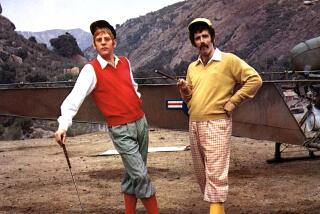Donald Swann; Half of Flanders and Swann Musical Comedy Act
- Share via
Donald Swann, whose impish demeanor and owl-eyed expressions made him the more outgoing half of the jocular team of Flanders and Swann, has died in London.
The Associated Press on Friday quoted a family spokesman as saying he had died Wednesday in a London hospital. Swann was 70 and fighting prostate cancer.
Best known for their eccentric revues of the 1950s and ‘60s--”At the Drop of a Hat” and “At the Drop of Another Hat,” Michael Flanders and Swann paid homage in song and verse to unusual themes.
A perennial favorite ode was to a hippopotamus:
“Mud, mud, glorious mud, there’s nothing quite like it for cooling the blood.”
They also celebrated wart hogs, the London bus system, the gnu and the armadillo. An added touch was that they sang of these non sequiturs in several languages, including Greek and Latin.
Their blend of odd humor and biting satire made them world favorites until Flanders’ health failed.
Because of childhood polio, he used a wheelchair and gave up touring in 1967. Flanders died in 1975.
Swann had been the bemused pianist of the act, performing the Flanders-Swann repertoire with an expression on his face that indicated he might be slightly daft.
The bearded and more subdued Flanders sat at his side in his wheelchair offering up jokes that Swann found more hilarious than they sometimes were. Many times Swann was the object of Flanders’ derision.
Swann was born in Wales, but was half-Russian and grew up speaking the language.
He performed in theatrical revues at Christ Church College, Oxford. A conscientious objector, he returned to Oxford after World War II where he performed refugee relief work in the Middle East.
There he teamed with Flanders, the lyricist for the two.
Flanders and Swann first won fame in 1956 with “At the Drop of a Hat,” which ran for more than 1,700 performances in London’s West End and on Broadway for more than 200 performances.
After the partnership ended, Swann continued to compose but never regained his popular success.
He wrote an opera, “Perelandra,” song cycles and cantatas and dozens of instrumental works.
Survivors include his wife, Alison, and two daughters.
More to Read
The biggest entertainment stories
Get our big stories about Hollywood, film, television, music, arts, culture and more right in your inbox as soon as they publish.
You may occasionally receive promotional content from the Los Angeles Times.









